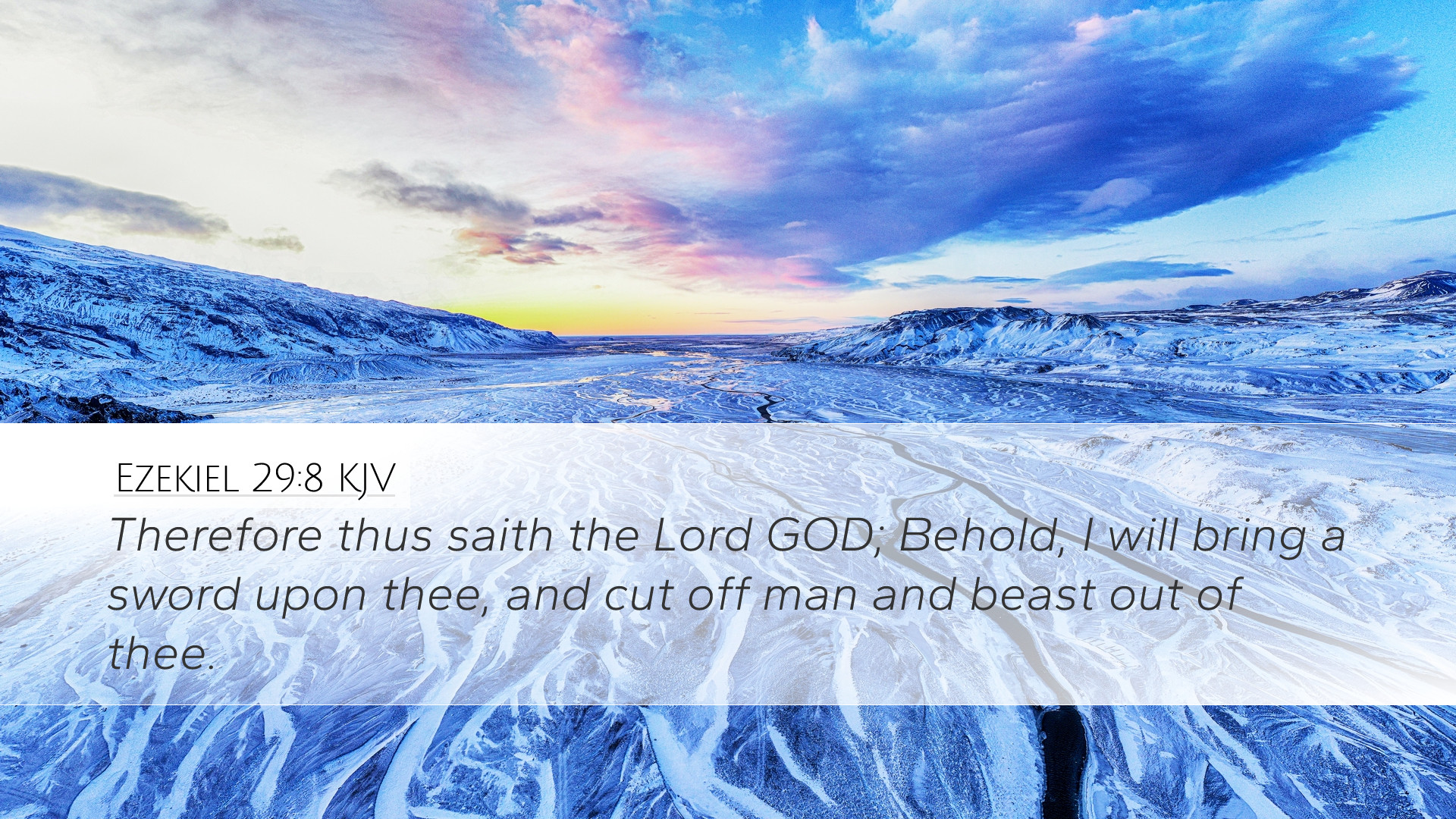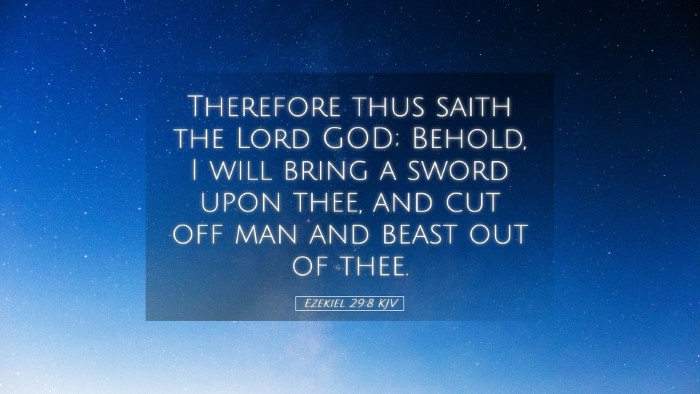Ezekiel 29:8 Commentary
Verse Text: "Therefore thus says the Lord God: ‘Surely I will bring a sword upon you and cut off man and beast from you.’"
Overview
The prophecy found in Ezekiel 29:8 is part of a larger oracle against Egypt, asserting God's judgment on a nation that had repeatedly turned away from Him. This verse encapsulates themes of divine retribution, the consequences of idolatry, and God's sovereignty over nations.
Contextual Framework
The book of Ezekiel is recognized for its vivid imagery and profound theological messages. The context surrounding this specific verse involves the historical backdrop of Judah's predicament in the face of Babylonian conquest and Egypt’s role as a waning superpower. The Israelites, in their desperate situation, had sought refuge in Egypt, trusting in a nation that was no longer under the gracious watch of God.
Matthew Henry's Insight
Matthew Henry emphasizes the certainty of judgment as pronounced in this verse. He notes that God employs the sword as a means of discipline for nations that defy His authority. Furthermore, Henry highlights that Egypt's failure to acknowledge the God of Israel leads to its impending downfall, paralleling the fates of nations that oppose divine will.
Main Points from Henry’s Commentary:
- God's Sovereignty: Henry illustrates God's ultimate control over nations and His capacity to bring about justice.
- Judgment on Idolatry: The verse reflects the broader theme of God's condemnation of idolatrous nations, as Egypt was known for its severe idol worship.
- The Purpose of Discipline: The impending judgment serves as both punishment and a call to repentance, indicating that discipline can lead to restoration if acknowledged.
Albert Barnes' Commentary
Albert Barnes provides an analytical approach to interpreting Ezekiel 29:8. He outlines how God's divine retribution is often manifest through military campaigns and the resulting desolation. Barnes argues that God's decree to remove both man and beast is indicative of total judgment, affecting the entire society of Egypt.
Key Takeaways from Barnes:
- Comprehensive Judgment: He points out that the catastrophic decline will not only hit the people but will also extend to the agricultural and economic structure underpinning their existence.
- Historical Importance: Barnes discusses the significance of historical context, illustrating how Israel's reliance on Egypt for protection was misguided, leading to an eventual downfall.
- Theological Implications: The consequences of this prophecy extend beyond Egypt, serving as a warning to all nations that disregard divine commands.
Adam Clarke's Interpretation
Adam Clarke approaches this passage with a focus on the prophetic nature of Ezekiel's words and the implications of divine judgment. Clarke highlights the symbolic nature of "sword" as both a literal and metaphorical instrument of judgment.
Insightful Aspects from Clarke:
- Sword as Judgment: Clarke expounds on how the sword symbolizes not only destruction but the precision of God's judgment that cuts through false security.
- Impending Doom: He reflects on the implications for both the citizens of Egypt and the Israelites, marking a transition period for both groups under the auspices of God's will.
- Call to Acknowledge God: Clarke emphasizes the importance of recognizing God's authority and the folly of trusting in human powers such as Egypt.
Theological Application
This verse, along with its commentaries, opens avenues for deeper reflection for pastors, students, and scholars. Key theological applications could include:
- The Nature of God's Discipline: Understanding that divine retribution is not solely punitive but can also encompass transformative potential.
- Trust in God over Nations: Encouragement to rely on God’s everlasting sovereignty rather than the shifting sands of earthly powers.
- Repentance and Restoration: Acknowledging that the themes of judgment always call for reflection, repentance, and a return to righteousness.
Conclusion
Ezekiel 29:8 serves as a stark reminder of God's authority and the consequences of abandoning His ways. Through the insights of prominent biblical commentators like Matthew Henry, Albert Barnes, and Adam Clarke, we gain a multi-faceted understanding of this prophetic warning. It remains pertinent for contemporary audiences, challenging us to evaluate our allegiances and the idols we may unknowingly serve.


